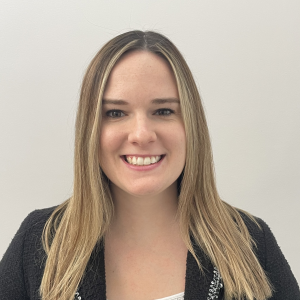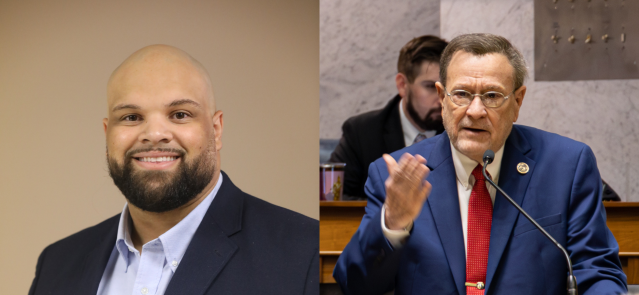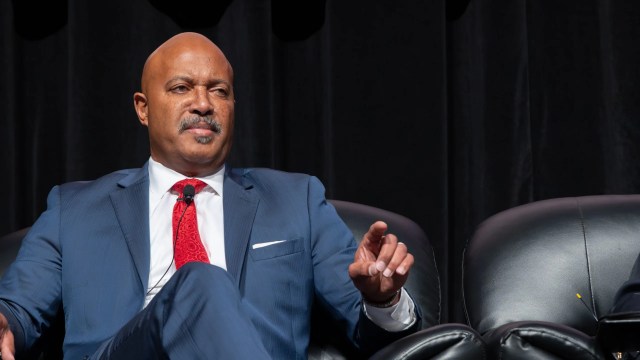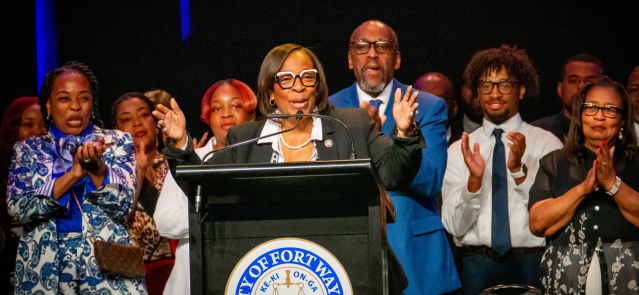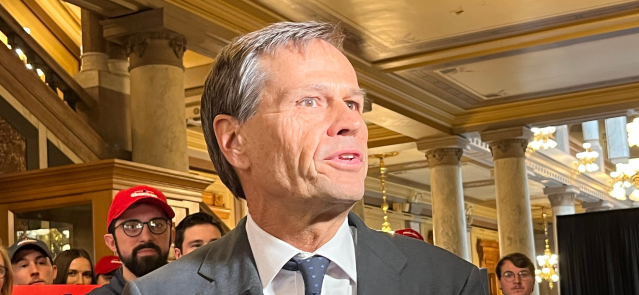Stay ahead of the curve as a political insider with deep policy analysis, daily briefings and policy-shaping tools.
Request a DemoRep. Harris on leading the Black caucus, 21st Century Scholars expansion plans
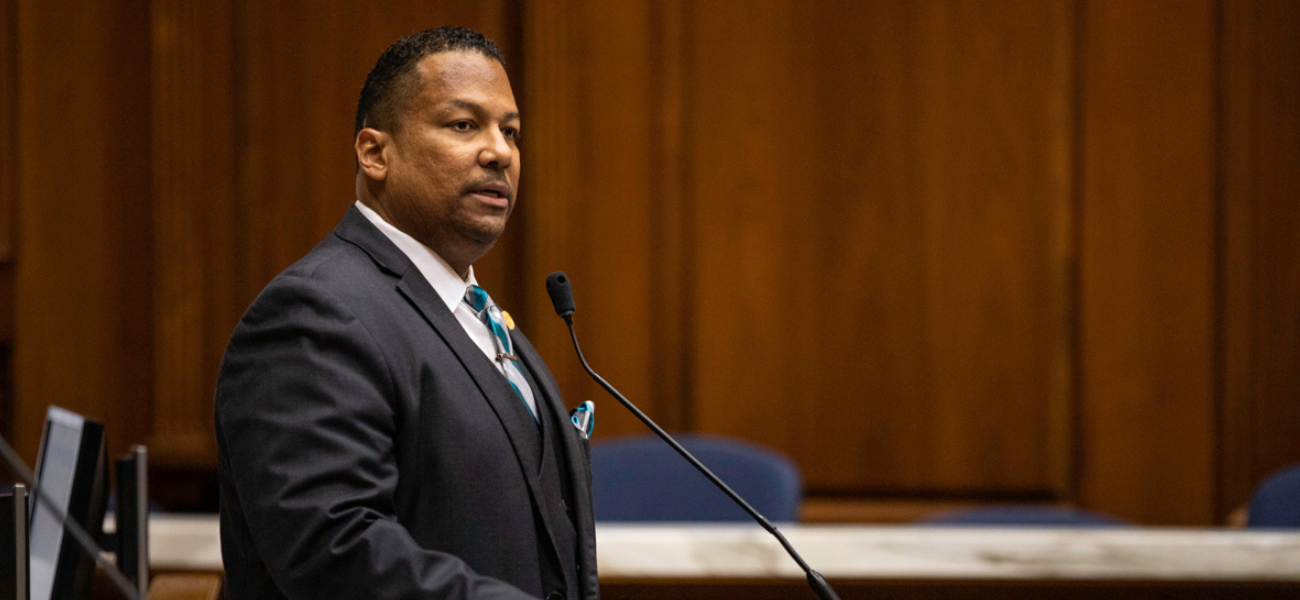
Rep. Earl Harris Jr., D- East Chicago, speaks during a House session in February 2023. (Credit: Indiana House Democrats)
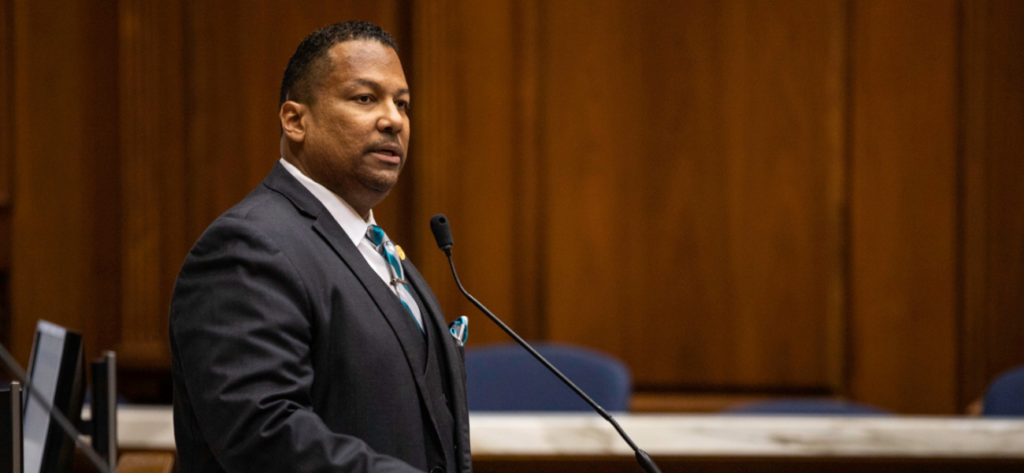
East Chicago Rep. Earl Harris Jr. is new to his role as the head of the Indiana Black Legislative Caucus, but the Democrat’s name might sound familiar.
He follows in the footsteps of both of his parents. His father, Earl Harris Sr., served a portion of northwest Indiana as a lawmaker for more than 30 years by the time he passed away in office. His mother was caucused to serve the district before Harris Jr. was elected in 2016.
Perhaps Harris Jr.’s biggest legislative accomplishment to date was being chosen this December to lead the Black caucus, one of the more politically active caucuses in the Statehouse.
State Affairs talked to Harris about following in his parents’ footsteps, IBLC’s legislative agenda, getting bills passed in the superminority and his bill expanding the 21st Century Scholars program, as the 2023 session starts to wrap up.
This conversation has been edited for clarity, brevity and length.
Q. Your parents both served in the Statehouse. Did you always know you wanted to run for office because of that?
A. I do follow in the footsteps of both my parents. My father served until March 23rd of 2015 when he passed away, and then my mother was caucused in. I was born and raised in East Chicago, [and at the time of his father’s death] was living here in Indianapolis.
I'm an only child. Dad had cancer so we knew it was a matter of time, so we had some conversations about what would happen. When Mom decided she wanted to stay in East Chicago, I moved back to East Chicago.
After the dust settled, people started talking to my mother about her running to replace my father. And then me running [after]. The original plan was Mom was going to run for reelection, and then I was going to run two years [after that]. She had a health issue and ended up in the hospital, so we decided it was not a good idea for her to have to deal with running for office. It moved up the timeframe of me running by two years.
Q. Why was it important to you to honor your father's legacy in that way?
A. Some of it was there were things that Dad worked on, things we wanted to continue in growing the area, and then I brought into it some of my own experiences. A lot of the time when I lived here in Indianapolis, I worked in Indianapolis Public Schools, and so education is a big thing for me.
Being around this [building] almost all my life, I jokingly said I already knew where the bathrooms were when I got elected. [This was] really an opportunity to dive all the way in and see what good I can do.
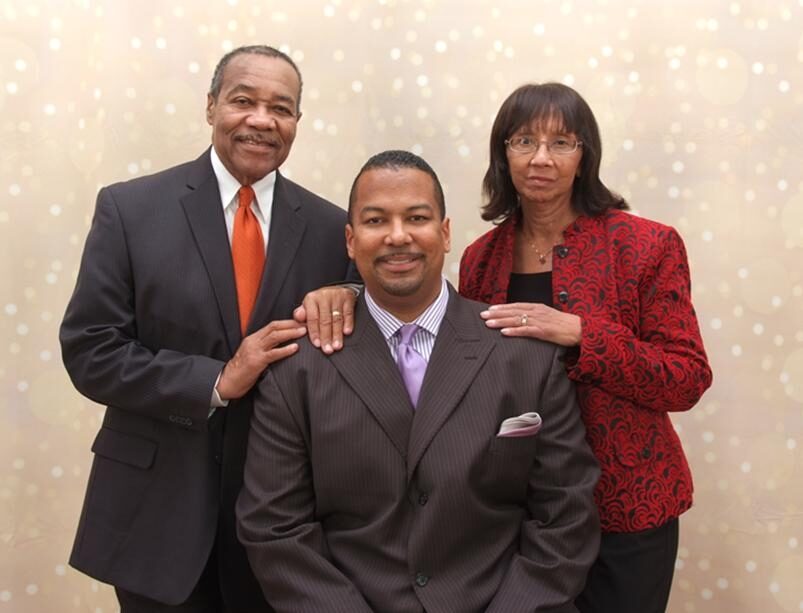
Q. The IBLC's agenda this year is largely focused on educational attainment. Why is that?
A. Every year, IBLC has a theme for our agenda, and everyone gets to submit a bill. This year's theme is closing the achievement gap. Part of that came out of we know that COVID really did a lot of damage for all young people in terms of education. For Black and brown kids [it caused] a little bit more damage.
We're the Indiana Black Legislative Caucus, but when you look at our pieces of legislation, they really do benefit, for the most part, everybody. We really want to see what we can do in terms of legislation that would make things better for young people, and again, try to catch people up.
Q. Can you describe some of the bills the IBLC has pushed this legislative session?
A. They focus on education; they focus on achievement. Some of them are very directly [tied to it]. But some of them are connected to it. When you look at a bill about universal free school breakfast and lunch, when you talk about tax credits [for teacher supplies], when you talk about putting seat belts on school buses, when you talk about bias crimes, domestic violence, those are things that may not be direct classroom type things, but they affect how young people are going to learn and so they fit into the mix.
One that I'm extremely proud of that I authored is House Bill 1449. That has to do with 21st Century Scholars. So many times since I've been in office a parent will say, ‘My kid’s in high school and they want to continue education post-high school. Do you have any ideas on how they can pay for it?’ One of my first answers to them is, ‘Are they a 21st Century Scholar?’ And most of the time, if not all, the parent looks at me and goes, ‘What's that?’ If they're in high school, it's too late to sign up.
I filed a bill last year about 21st Century Scholars that would have moved back the signup date, and it would have made it a click box on free and reduced lunch. Over the summer, right after Chris Lowry had just become the new commissioner of [Indiana's Commission for Higher Education], we were having a conversation outside in the [Statehouse] parking lot. As I like to jokingly say, that's where all the important conversations happen.
We started talking about automatic enrollment, so that's really where this year's version of the bill came from. Even if students don't know they are eligible for it, they’ll get enrolled into the program. And CHE [Commission for Higher Education] will do more work to inform parents, inform students and help students get prepared for college.
We also know that this is something that's on the governor’s agenda. We're very proud of that. We should do whatever we can to help people continue their education post-high school. I don't care if it's a certificate, two-year degree, a four-year degree. If you look at the bills I’ve filed and look at one of my agenda items, education and continued education is a big priority.
Q. It’s kind of unusual to see a Democrat carrying a Republican governor’s agenda item. Was that just a coincidence?
A. This is one of those cases, which hopefully there are more of these than not, where it really doesn't matter if you're an R or a D, it's about what's good and what's best for the state and how can we make things better. It's not as if the governor and I sat down and had a conversation about this. It just worked out that way.
Back in my 20s I learned this whole theory of a win-win. Do things where everyone wins. The student wins because they have money for college, the parent wins because their student has money for college. Universities and colleges win. They're not at 100% capacity, so it's more butts in seats. Businesses and organizations that are going to hire win because [there are] more educated, trained, skilled people, and it helps us as a state. 21st Century Scholars has a 10-to-1 financial return. I was not a finance major, but I know that if for every dollar I give you, you give me $10 back, that's a great deal. So it really is a win-win.
Q. How successful has IBLC been this session in getting its agenda moved?
A. Besides House Bill 1449, which is mine, [Rep.] Carolyn Jackson has House Bill 1138, which is [about] preschool childcare facility drinking water. Rep. Jackson, since she got elected, has been very focused on making sure that young people have clean water that isn’t full of lead, full of other things that could cause health issues.
It's all about the long game. So as much as we would love for every bill we file to become law in the first year or two, that's not the reality of what's going to happen. You lay groundwork and you continue to push and get things done.
Q. There are only Democrats in the IBLC. Because Republicans hold the supermajority, how does that impact how successful you are?
A. Well, IBLC is nonpartisan; it just turns out that all of the members are Democrats just because of the way it works out here. But I said this when I ran the first time, I'm a big believer that relationships equal resources. It's about those relationships. It's about having conversations with people and helping people understand [your legislation].
There was a bill that did not get heard this session, and I'm on Ways and Means, and Chairman Thompson said, ‘Hey, I'm not going to hear your bill this year. But let's talk about it over the break.’ So that's also what happens as you build those relationships.
As we continue to work on things, we know that that's vital, not just because we're IBLC members, that's vital because we are in this superminority. We know that the way the math works out, if you're a Democrat you can't get anything done if you don't have Republican support.
Q. Why should all Hoosiers regardless of race care about what the IBLC is doing?
A. The agenda is beneficial to everyone. When you look at our agenda of closing the achievement gap, it doesn't matter if you're an R, it doesn't matter if you're a D, it doesn't matter your ethnicity, your gender. That's an important thing for all of us.
The bills we've authored and the bills that are going through are going to benefit everyone here in the state of Indiana. It doesn't matter what the author or the senator or representative looks like.
Q. In 2021, there was tension in the Statehouse over race after some Black lawmakers were booed while talking about whether a bill was racist or not. Do you think attitudes toward race in the Statehouse have shifted at all since then?
A. My hope is things continue to get better, but we've seen some things on the national level that make you wonder if we're heading in the wrong direction.
We'll do what we can to make it better, but we understand that there's a lot more than just [those of] us that are elected here at the Statehouse can do to help this out. My hope is other non-Black legislators understand a little bit more about the reality of things that we have to face as minorities and understand that it's a little bit different than what white people have in terms of experiences.
Representative [Vanessa] Summers has a bill on implicit bias in medicine. We know that's an issue. That's not only an issue here in Indiana. There was a [Black female Indiana] doctor who recorded herself talking about how [doctors] wouldn't do what they were supposed to do [when treating her]. Even a celebrity — rich, famous, Serena Williams, the tennis player — it’s well-documented that when she was going through her health issue around her pregnancy and childbirth, she couldn't get doctors to pay attention and listen.
There's lots of stories like that.
Q. Last year you earned the 2022 Civility in Government Award. How do you keep that reputation enough to earn that award when things can be tense in the Statehouse?
A. If we're going to be successful as members of the Indiana General Assembly, and I say this for everyone, you have to get along. We're not always going to agree, and that's sometimes inside of the same party. Not every Democrat agrees with every Democrat and not every Republican agrees with every Republican, but you have to understand that OK, I can look at the legislation you file. I may not like it, but it doesn't mean that you are my enemy. We may think differently, but maybe I can talk to you and maybe build some understanding.
I think you get a little bit further with that than yelling and screaming at the top of your lungs at someone and pointing fingers and all of that. It's not my style in general, even before I came here. I think if you do that in a lot of cases, the person you're doing that to is just going to shut off. I don't think that ever is going to be the right way to go and get anything done, especially in this space.
Q. Ending on a lighter note, what do you like to do in your free time?
A. It depends. I'm big into music and sports. Prince did not come to Indiana and discover me so I'm very disappointed in that, but I'm a big musicaholic, sports, entertainment. I try to do things that are relaxing. I actually went to see Jo Koy, the comedian, Saturday in Chicago.
And then I also am [really into] bike riding. I'm glad that the weather is getting warmer because it's time to get back on the bike, improve my shape, and lose a few pounds. Being here at the Statehouse, there's way too much sitting and way too much eating.
I love hanging out with my family and friends. I don't get to see them as much during session because it just takes up so much time. Because of my background in media, creativity is always something fun, so anything that's creative usually draws and gets my attention like movies, television shows, etc.
Contact Kaitlin Lange on Twitter @kaitlin_lange or email her at [email protected].
Twitter @StateAffairsIN
Facebook @stateaffairsin
Instagram @stateaffairsin
LinkedIn @stateaffairs
Read this story for free.
Create AccountRead this story for free
By submitting your information, you agree to the Terms of Service and acknowledge our Privacy Policy.
Newcomer Clay challenges longtime incumbent Young for state Senate
A central Indiana state Senate race may soon serve as a barometer for state Republican politics, as a young upstart groomed for leadership faces down a longtime incumbent in the upcoming primary election.
The race for Senate District 35, which includes parts of Marion and Hendricks counties, revolves around similar conservative beliefs held by wildly different candidates.
State Sen. Mike Young, 72, is a Statehouse fixture who refuses to attend his committee meetings or caucus with his fellow Republicans but nonetheless offers nearly four decades of legislative experience to his district.
Philip Clay is a 29-year-old retail banker with a young family and no political experience. He seeks to bring more collaboration to the role.
If elected, Clay would be the only Black Republican in the Indiana General Assembly.
“Unpopularity in the Statehouse doesn’t always translate to being unpopular in the district,” Mike O’Brien, president of 1816 Public Affairs Group and former Hendricks County Republican Party chairman, said of Young.
“You have a young guy working hard, and that’s kind of what it takes to beat a long-term incumbent,” O’Brien said. “We see examples of that every cycle. Maybe this is the one this time.”
Young no longer caucuses
Young, who served in the Indiana House of Representatives from 1986 to 2000 before moving to the state Senate, made headlines in summer 2022 when he decided to no longer caucus with his party.
“I won’t caucus because I don’t trust our leadership,” Young told State Affairs. He stressed his decision had nothing to do with his failed amendment to the state’s abortion ban, saying he wrote a letter expressing his intent to leave before the abortion bill was heard.
Young said he remains part of the caucus, as he is a Republican senator, but simply does not attend meetings.
He has also stopped going to most meetings of his assigned Senate committees: Corrections and Criminal Law, Elections, Family and Children Services, and Pensions and Labor.
“I go to them if they affect my district,” Young said.
He attended a Jan. 17 Pensions and Labor Committee meeting to argue down Senate Bill 54, which Young said would have hurt Wayne Township firefighters by forcing them to consolidate with the Indianapolis Fire Department.
Young said all senators are asked to pick five committees they’d want to serve on, but Senate President Pro Tempore Rodric Bray did not select him for any of his listed options. Young informed Bray he did not intend to attend future committee meetings.
Bray also replaced him as chair of the Corrections and Criminal Law Committee and removed him from the Judiciary Committee. Attempts to reach Bray for comment were unsuccessful.
“You don’t have to be on committees to get things done,” Young said. “When the bill comes to the floor, you have the opportunity to amend just like you would in committee. So there’s nothing really lost or harmed by it.”
Clay’s push for office
Clay, who has lived within the district in Plainfield for most of his life, said Young’s decision to no longer caucus motivated him to get into the race.
“There’s a lot of things Mike and I agree on, but after Mike left the Republican caucus and voiced some personal grievances with the Senate … it’s kind of like watching your favorite player not show up to the game,” Clay said.
Clay said one of his primary campaign platforms is improving workforce development within the district as. He co-founded Arthur Clay and Co., an organization focused on preparing men of color for their future careers.
Like Young, Clay is anti-abortion. Whereas Young seeks to eliminate property taxes, Clay believes reform is the more prudent path. Clay also hopes to improve education, make adoption easier and increase public safety if elected.
Clay trained with both the national and state GOP in 2022, completing the Republican National Committee’s Rising Star and Indiana Republican Diversity Leadership Series training programs geared toward recruiting minority conservatives for public office.
“There are so many well-qualified minority conservatives that we’ve not done a good job in either messaging to or helping them explore the Republican Party,” Clay said.
“There are Black conservatives across the country,” he said. “To have the opportunity to be the only one in the state is an incredible honor. It’s absolutely something I don’t take lightly.”
Support from Indiana Chamber
Both candidates have spent tens of thousands of dollars on their campaigns as of March 31.
Clay spent just under $34,000 in the first quarter of 2024, leaving him with about $30,000 left for a final push.
Young has spent around $29,500 and has about $45,000 remaining.
While Young has raised from various sources — including other lawmakers, small-dollar donors and $22,000 in personal loans — much of Clay’s backing has come from one source: the Indiana Chamber of Commerce.
The Chamber’s political action committee, Indiana Business for Responsive Government, has given Clay almost $21,000, plus another $11,000 from in-kind donations.
Jeff Brantley, the Chamber’s senior vice president for political affairs, said Young’s voting record does not often align with his organization.
“He talks a lot, but he can’t get things done in one of the more rapidly growing suburban districts in the state,” Brantley said of Young. “Constituents aren’t being fully served.”
Brantley said Clay could bring both a fresh perspective as the Legislature’s only Black Republican and new life to the seat.
“The district needs and deserves someone who really has the energy and the engagement,” Brantley said.
Young said the Chamber was “beating up on him,” even though he has worked to get Chamber-supported legislation through the Statehouse. He listed reducing the state’s license plate tax as one example.
The senator has been endorsed by the Indiana Family Action PAC, Indiana Right to
Life, Hoosier Conservative Roundtable, American Family Association of Indiana
PAC and the Indiana State Police Alliance.
Taxes key to Young’s reelection bid
If reelected, Young hopes to end property taxes for all Hoosiers, particularly those over 65.
“Speedway has neighborhoods where most people have lived in their homes for 50 years, and they’re on fixed incomes,” Young said. “And when they get a 48% [tax] increase, that’s killing them. They can lose their house.”
Young has pushed the idea for more than a decade, and he believes momentum and money exist to get it done next year, when the Legislature will set the state’s budget.
Indiana could be the first state to end property taxes for seniors “with no strings attached,” Young said.
He said he would also work to “stand up for conservative values”: supporting tax cuts, opposing a plan to give “illegal immigrants” driver’s licenses and creating a rule in the state senate requiring 24 hours’ notice to changes in the state budget.
O’Brien, the former Hendricks County GOP chair who has followed Young’s career for years, said the senator’s long incumbency will be tough to beat. He added that Young’s reputation as a thorn in leadership’s side isn’t necessarily a detriment in the May 7 primary election.
“Go-give-’em-hell gets you a lot of votes,” O’Brien said. “That’s why [former President Donald] Trump is doing what he does. It’s just the mood of the electorate right now.”
Contact Rory Appleton on X at @roryehappleton or email him at [email protected].
And subscribe to State Affairs so you do not miss an update.
Facebook @stateaffairsin
Instagram @stateaffairsin
Bringing back barnstorming: Curtis Hill and his run for governor
A week after Hamas attacked Israel, Chris Just attached American and Israeli flags to the back of his Gladiator and drove to the second-annual Central Indy Jeep N’Vasion at the Johnson County Fairgrounds.
Wind blew over tents, and grim clouds approached. There, in Franklin on Oct. 14, 2023, a volunteer with former state Attorney General Curtis Hill’s gubernatorial campaign approached Just. Asked if his vote was already decided, Just said he hadn’t thought about it yet: “I know I’ll vote Republican, but I just don’t know who.” (Four years ago, Just voted for Libertarian Donald Rainwater after losing faith in Gov. Eric Holcomb.)
The volunteer brought over Hill, who introduced himself to Just. The two chatted about Jeeps, the event and topics unrelated to politics. After several minutes, Hill and Just posed for a picture in front of the Gladiator — flags prominently displayed behind them. “It gave me an introduction to who he was,” Just told State Affairs.
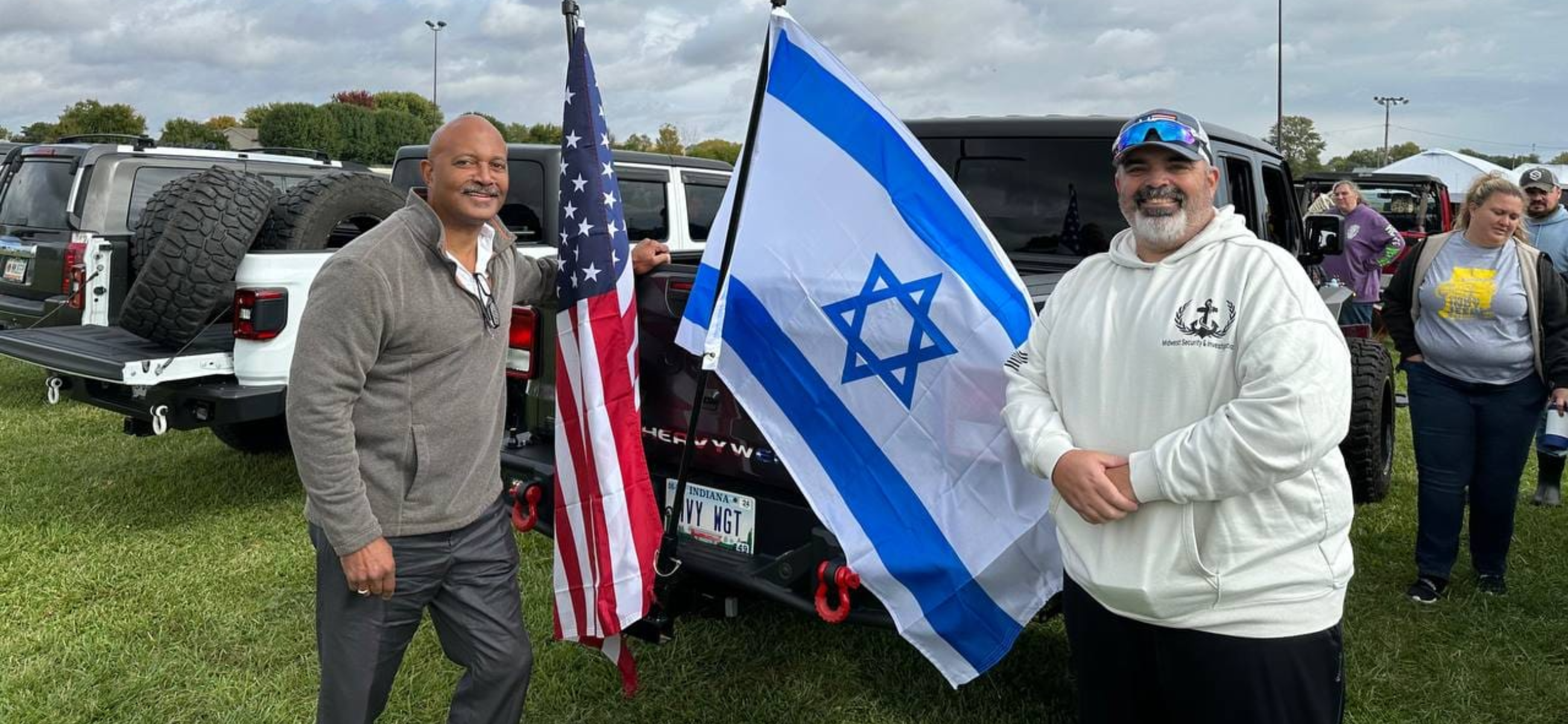
Presumptive voters like Just are the Hoosiers Hill’s campaign hopes to sway ahead of the May 7 primary. Polling in single digits, Hill will likely need them to prevail. In the six-candidate race, he has placed fifth in every poll conducted this year. And Hill has spent only a fraction (about $290,000) of the millions spent by other wealthy, self-funded candidates through the first three months of 2024.
In absence of the same financial treasures enjoyed by his opponents, Hill’s campaign has adopted a different approach, shunning pricey TV ads in favor of in-person events. His campaign chair since November, Jackie Horvath, said Hill, 63, flourishes in front of crowds. “Whether it be in front of thousands or in front of hundreds or tens or one-on-one, he just has that gift,” she said. Lincoln Day Dinners, for example, have been staples for the campaign, which believes enough voters will be convinced of Hill’s message to make traversing the state worth it. “You just have to be more targeted,” Horvath said.
Ahead of the primary, Hill has already earned political victories. In January, he was the first to call for the Indiana Department of Health to resume releasing terminated pregnancy reports to the public. The department had halted their release, arguing the individual reports could be reverse-engineered to identify women who have had an abortion. (The department still shares quarterly roundups with aggregate data of the individual reports.)
Hill, in a news release, said the department was “arrogantly disregarding the law” and its decision “directly contradicts the previous treatment” of the reports. He insists releasing them is the only way to ensure the state’s near-total abortion ban can be enforced.
Attorney General Todd Rokita’s office earlier this month issued an official opinion contending individual abortion reports are not medical records and can be released to the public. In a news conference announcing the opinion, Rokita credited Hill for highlighting the issue. Hill’s former opponent said voters should ask other gubernatorial candidates “where they stand on this.” During an April 23 debate, other Republican candidates said they would push for the reports to be released after Hill questioned them.
And in February, Hill implored Holcomb to deploy Indiana National Guard members to Texas, as more than a dozen other states have done. Days later, Holcomb committed to sending 50 members. He justified the decision by blaming the federal government for not properly enforcing immigration law at the border with Mexico.
Yet, despite his continued influence on Indiana politics, Hill has struggled to win over Republican voters.
“He’s kind of like that pain in your side that just won’t go away for Republicans, and I wonder if his campaign is more about spite than anything else,” said Julia Vaughn, executive director of Common Cause Indiana, a nonpartisan organization that advocates for transparent governance.
The fall
Perry Township Republicans held a Lincoln Day Dinner April 2 at The Atrium, an unassuming banquet and catering facility tucked away in a strip mall off of Thompson Road in Indianapolis. U.S. Rep. Jim Banks was scheduled to be the featured speaker, and the event drew many of the state’s most notable conservatives.
Before the dinner started, Hill told State Affairs he doesn’t believe Hoosiers want “elite candidates.” He believes there is still a place for barnstorming around the state and delivering a message in person.
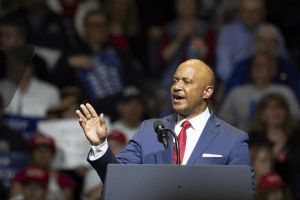
In 2016, Hill was elected state attorney general. Before that, he spent 14 years as the elected prosecutor for Elkhart County, where he was born and raised. The youngest of five children, Hill earned a Bachelor of Science in marketing and a Doctor of Jurisprudence at Indiana University, where he met his wife, Teresa, according to his campaign website. They are now parents of five.
During his time as attorney general, Hill was a champion of socially conservative causes, taking to Fox News to opine on national anthem protests, crime and homelessness in San Francisco. Many considered him a “rising star” in the Republican ranks.
But Hill’s once-promising political career derailed when the Indiana Supreme Court suspended his law license for groping four women at a party marking the end of the 2018 legislative session.
The court found “by clear and convincing evidence that [Hill] committed the criminal act of battery” against three female legislative staffers — ages 23 to 26 at the time — and a Democratic legislator. Hill has maintained his innocence, saying he never inappropriately touched the women.
Prior to the court’s decision, a special prosecutor declined to file criminal charges against Hill. The women filed a civil lawsuit in July 2020, claiming Hill committed battery against them. In early April, a Marion County judge called off a jury trial for the case, which remains pending. (Attorneys representing the women did not respond to a State Affairs request for comment.)
Following the state Supreme Court’s decision, Democrats and many Republicans — including Holcomb — called for Hill’s resignation. But Hill did not resign. Instead, he fulfilled his term and lost a close 2020 Republican attorney general nomination to Rokita.
Hill has since kept a mostly low profile. His most notable foray came in 2022, when he launched an unsuccessful bid to replace the late U.S. Rep. Jackie Walorski. (He lost to U.S. Rep. Rudy Yakym, who was backed by Walorski’s family.) In 2022, Hill was also supposed to be involved in a mock trial of Dr. Anthony Fauci, the former director of the National Institute of Allergy and Infectious Diseases. Hill said an episode was filmed, but technical difficulties caused it to “fizzle out.”
Hill has kept busy with his namesake law practice and a consulting business, Maverick Consulting LLC. He has worked with the anti-vaccine nonprofit Children’s Health Defense and Robert F. Kennedy Jr. as a consultant on “some post-pandemic matters.” And he participated in a senior fellowship at the conservative-leaning think tank Center for Urban Renewal and Education.
When he spends the weekend at home, Hill tries to make time for tennis with friends. They call themselves the Brandy Boys. Their Saturday routine: tennis, then breakfast and “a celebratory bottle of brandy that goes a long way.”
Hill told State Affairs the fallout from the court’s decision to suspend his license has been an “unfortunate chapter.” He said it was “a sign of the times when you’re a popular, particularly conservative figure, and knives come out.” Asked whether he would have done anything differently that night, Hill said he “probably would have gone home.”
His vision
On the campaign trail, Hill has advocated for a comprehensive tax plan. His proposals include cutting Indiana’s corporate income taxes and the state gas tax while also eliminating state income taxes for residents who are 18 to 35, according to his campaign website. But he says “wasteful spending” must be addressed before the tax breaks can be realized. (Hill has criticized Lt. Gov. Suzanne Crouch’s proposal to eliminate state income taxes for all residents.)
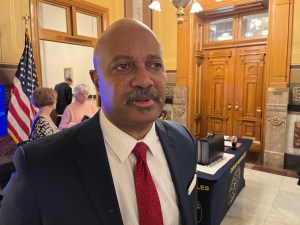
In addition, Hill’s campaign centers on stopping “the flood of illegal immigrants” and preserving “medical freedom.” At the COVID-19 pandemic’s zenith, Gov. Holcomb implemented a mask mandate in Indiana. Hill pounced on the decision, arguing Holcomb overstepped. “We had a government that failed us in many respects by providing misinformation, wrong information,” Hill said, pointing to guidance on mask usage changing as the pandemic progressed.
Hill maintains the damage done by government lockdowns “far exceeded the damage that was done by the virus itself, and we’re still seeing that a lot of businesses were scuttled. A lot of school kids have some learning and social behaviors that are offset because of the time that was taken away from the education process.”
Leah Wilson, executive director and co-founder of the nonprofit Stand for Health Freedom, said Hill “wasn’t tricked like others were” during the COVID-19 pandemic. “Most of the others you talk to say it was justified to cancel freedom for at least a few weeks,” she said of the other gubernatorial candidates. Because of that, Wilson’s organization endorses Hill. She said he is “not excitable, which allows him to be unwavering.”
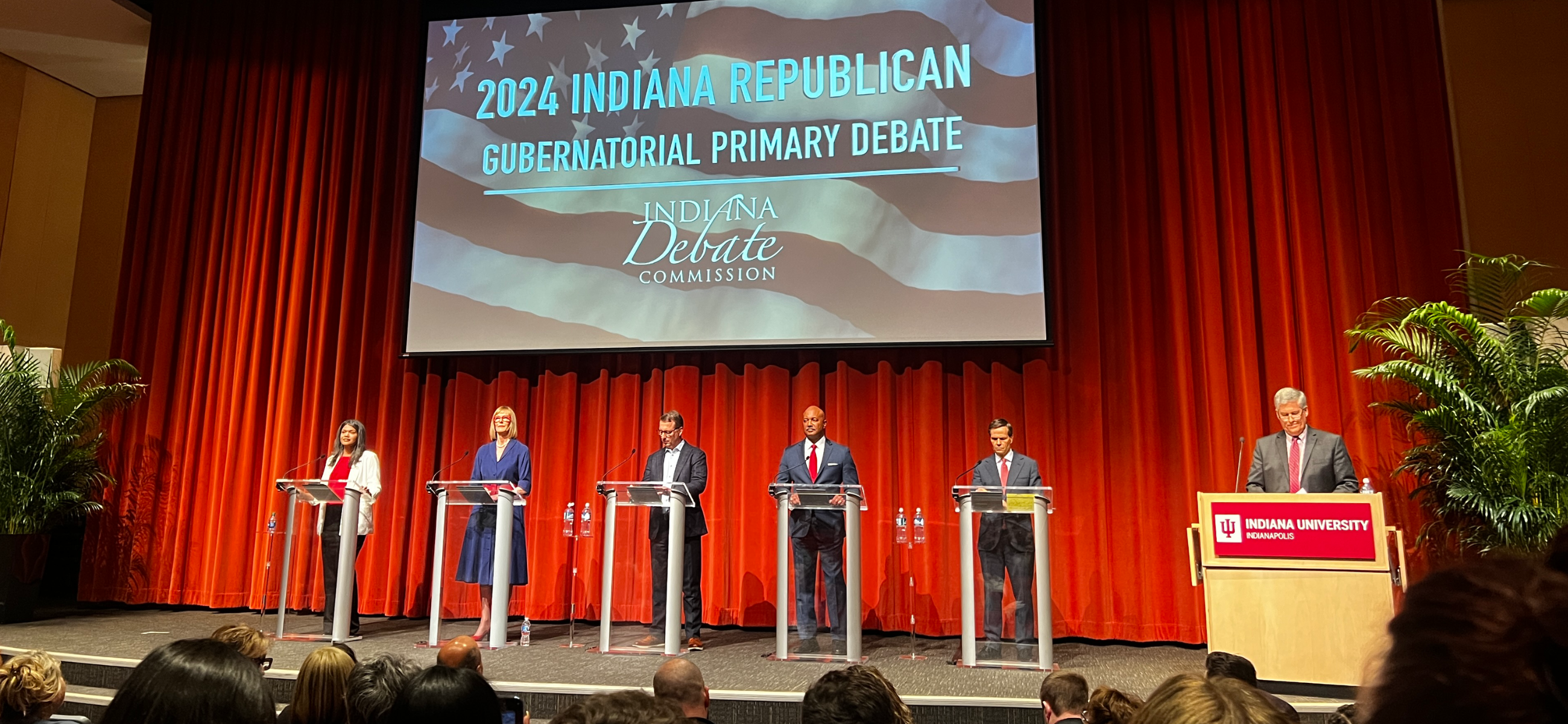
Asked during debates about his other policies, Hill has compared the federal government to a “crack dealer” that attaches programmatic “entanglements” to its financial support of schools. If elected as Indiana’s next governor, he wants to do away with the entanglements, cut government regulations to help more child care facilities enter the market, empower locals to make their own economic development decisions, corral the Indiana Economic Development Corp. and end diversity, equity and inclusion practices in state government as well as “radical gender ideology” and “critical race theory” in classrooms.
“Objective truth is under assault on a regular basis,” Hill told State Affairs. “I think the manipulation of the justice system, the weaponization of race, the sexualization of our children call upon us to have a new administration of freedom.”
Asked about his chances of winning after several poor showings in recent polls, Hill said, “The only poll that matters is the poll on May 7.”
State Rep. Ed DeLaney, D-Indianapolis, said Hill had “managed to bring discredit to his office in an unusual and particularly terrible fashion.” In 2019, DeLaney authored a resolution urging the House to conduct an investigation of the allegations against Hill, but it wasn’t taken up.
Hill came into the gubernatorial race as a “hard-right, pro-Trump” candidate, DeLaney said, “but he hasn’t had money to send that message. And when, essentially, almost all of the candidates are sending that message, how does he distinguish himself? So, sadly for him, this distinction is the one that I pointed to: He got himself in this horrible situation.”
Horvath, Hill’s campaign chair, sees his situation differently. She described the allegations against Hill as a “he said, she said” scenario that has only been brought up sparingly on the campaign trail.
In The Atrium lobby, Hill spoke with his team, surrounded by bustling conservatives. Just, the Gladiator owner, walked through one of the facility’s entrances — he was there to support Andrew Ireland in the House District 90 race — and spotted Hill. The pair reminisced about the Jeep show. “He remembered exactly what the Jeep was; he remembered everything about it,” Just told State Affairs of his conversation with Hill.
Hill asked Just to “remember” him during the upcoming primary election, Just told State Affairs. Yet, after their April encounter, Just said he is “still kind of closed” on the candidate he plans to vote for.
“I still haven’t made up my mind yet,” Just said. But he acknowledged Hill “definitely left a mark.”
About Hill
- Age: 63
- Hometown: Elkhart
- Education: Bachelor of Science in marketing and Doctor of Jurisprudence from Indiana University
- Family: Wife, Teresa, and five children
- Job: Attorney, consultant
- Work history: Indiana’s 43rd attorney general (2017-2021), an attorney since 1988, consultant with Maverick Consulting LLC, Elkhart County prosecutor (2003-2017)
Read these related stories
- Eric Doden is running from behind but hopes his ‘bold vision’ will propel him forward
- Suzanne Crouch positions herself as a ‘different’ candidate for the voiceless
- Mike Braun on why he wants to be in politics ‘at a level of significance’
- Who is Jamie Reitenour? Indianapolis mom mobilized volunteers to make governor’s ballot
- Brad Chambers sells himself as ‘business guy’ to lead Indiana
Contact Jarred Meeks on X @jarredsmeeks or email him at [email protected].
X @StateAffairsIN
Facebook @stateaffairsin
Instagram @stateaffairsin
LinkedIn @stateaffairspro
Indiana makes history with record number of Black mayors, half of them women
FORT WAYNE, Ind. — Five years ago, Gary’s Karen Freeman-Wilson was the only Black female mayor in Indiana. After she lost a third Democratic nomination to Jerome Prince, there were none.
With Sharon Tucker’s Fort Wayne Democratic caucus upset win on Saturday in a seven-candidate race to succeed the late Mayor Tom Henry, Indiana now has four cities led by Black women. Each took a different path.
Democratic Vanderburgh County Councilwoman Stephanie Terry won the open seat in Evansville, the state’s third-largest city, while Democratic Councilwoman Angie Nelson Deuitch defeated Republican Michigan City Mayor Duane Parry with 60% of the vote the same day. In Lawrence, Councilwoman Deb Whitfield won the Democratic primary and then beat Republican Deputy Mayor David Hofmann after Mayor Steve Collier retired.
Tucker defeated House Minority Leader Phil GiaQuinta and Stephanie Crandall, a top aide to Mayor Henry, on the second ballot Saturday. A jubilant Tucker told the 92 precinct officials and an overflow crowd at Parkview Field: “Today you had the opportunity to make history by electing the first 5-foot-3 mayor. To be in a place where they’re fed, loved and cared for, that’s my vision for our community.”
Many saw GiaQuinta as the front-runner going into the caucus, with at-large Councilwoman Michelle Chambers in contention. But Tucker’s fiery speech before the first ballot couldn’t be denied. “I’m the only candidate who stands before you who has all those boxes checked on her résumé,” said Tucker, noting she was the only candidate to be elected at both the county and city levels. “You see, as 6th District representative, I have had the pleasure of sitting at the table with developers and investors and telling them how great our city is and encouraging them to make investments.
“I fully understand government,” she added.
The applause Tucker received quickly indicated a new order would soon be unveiled. About 15 minutes later, she led GiaQuinta 38-30 on the first ballot (Crandall had 10), with 47 needed to win. Tucker prevailed on the second ballot over GiaQuinta and Crandall after Chambers and Wayne Township Trustee Austin Knox dropped out, and two other candidates were eliminated due to a lack of votes.
In a press release, Fort Wayne Democratic Party officials said, “Today, Mayor Tucker proved that she has the energy and support of our party, and we look forward to supporting her as she works to continue moving our community forward.”
Tucker will be the second woman to serve as Fort Wayne mayor. After Mayor Win Moses resigned in 1985 following a campaign finance law conviction, Deputy Mayor Cosette Simon served for 11 days before Democratic precinct officials returned Moses to office.
Tucker replaces Mayor Henry, who was elected to a city-record fifth term last November. Henry, who announced in February that he had late-stage stomach cancer, died on March 28 at age 72.
What’s happening in Indiana is historic. Not only are four Black women leading Indiana cities, but also for the first time in the state’s history, eight Black mayors across the state are serving at the same time. The others are Mayors Eddie Melton of Gary, Anthony Copeland of East Chicago, Rod Roberson of Elkhart and Ronald Morrell Jr. of Marion. Morrell is Indiana’s first Black Republican mayor.
In February, the House unanimously passed a resolution acknowledging the historic moment.
“Whereas, It is important to acknowledge all Black leaders who are implementors of selflessness and upholders of high standards and order. The courage to lead is not easy but it is an honorable notion to take pride in; and Whereas, The Indiana Black Legislative Caucus shows its full support of the work these distinguished mayors have put forth, and it is a privilege to honor and acknowledge their names and their duty to serve the citizens of Indiana to the utmost capacity,” House Concurrent Resolution 21 states.
“I don’t know that we have ever had this many Black mayors in city halls across the state of Indiana,” Indianapolis Recorder columnist Marshawn Wolley wrote last November.
Terry told WFIE-TV after she declared victory in November: “Honestly, it’s surreal. I never believed an African American could really be in this position. The fact is our city is ready to move forward, that this city really is for everyone and that we can be inclusive.”
Lawrence Mayor Whitfield, giving her first State of the City address in February, said, “During the last year, many of you may have heard me say, ‘It’s time!’ To me, that turn of phrase has meant so many things in so many contexts. It means it’s time to bring new, forward-looking leadership to our city. It’s time to take the momentum of the past administrations and move forward to achieve our goals. And, of course, it’s time to unite our city and make sure we are connected on a deeper level than ever before.”
Mayor Terry told Evansville residents at her first State of the City address last month: “One hundred days ago, we launched a new era in Evansville. We broke two glass ceilings, swearing in the first Black mayor and the first female mayor in the city’s 212-year history. The energy, the enthusiasm, the hope that I felt that day have carried us through these first 100 days as we’ve finished assembling our team and gone right to work moving Evansville forward.”
Terry added, “I said at my inauguration that I knew I was going to be held to a higher standard, and I knew you were going to be watching. And I told you I was ready. I told you I was going to make sure Evansville is a city that works for everyone, and I knew you were going to hold me accountable for that. I knew I was going to hold myself accountable, too.”
Brian A. Howey is senior writer and columnist for Howey Politics Indiana/State Affairs. Find Howey on Facebook and X @hwypol.
X @StateAffairsIN
Facebook @stateaffairsin
Instagram @stateaffairsin
LinkedIn @stateaffairspro
Brad Chambers sells himself as ‘business guy’ to lead Indiana
EDITOR’S NOTE: This is one in a series of profiles of the candidates running for Indiana governor.
Brad Chambers argues big ideas and actions are needed in the coming years to propel Indiana and its economy forward.
Chambers has already put $9.6 million of his own money toward that argument as he tries to transform himself from a successful real estate developer who was virtually unknown by the general public into the Republican nominee for governor.
The first steps for his entry into the governor’s race came during his time as Gov. Eric Holcomb’s state commerce secretary and leading the Indiana Economic Development Corp. — the agency tasked with attracting business growth to the state.
A big idea from Chambers’ time with the IEDC was the LEAP Lebanon Innovation District, a planned 9,000-acre hub for tech-related industries that has been a target of criticism from the other five Republican candidates in the May primary.
Chambers remains steadfast in defending the project as a needed asset to compete with other states for major projects and asserts Indiana needs more of that kind of leadership.
“What I bring to this race is I’m not making decisions — and LEAP is proof — I’m not making decisions on three-year election cycles because I’m not an elected official,” Chambers said during an interview with State Affairs. “I’m making decisions like a business guy — which is, ‘What’s good for Indiana?’ — no matter if I’m around to see it come to fruition or not.”
Path to business success
Chambers, 59, grew up in Indianapolis as a son of prominent businessman William Chambers, who participated in numerous civic organizations and was the finance chairman for Republican Dan Burton’s 1982 election to the first of his 15 U.S. House terms, according to the elder Chambers’ 1997 Indianapolis Star obituary.
Brad Chambers traces his business career back to a lawn mowing service he started with some friends while a Lawrence Central High School student.
He said he was using his share of the profits to pay his Indiana University tuition before one of the friends bought him out a few years later for $5,000. It became the seed money to purchase a repossessed house in Indianapolis as a rental property.
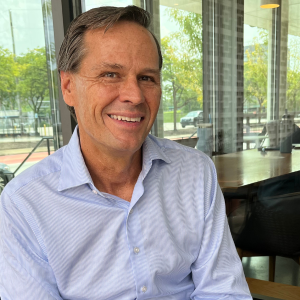
“I like to say it was divine intervention that I didn’t blow it,” Chambers said of the lawn service buyout.
That first property sparked his interest in the real estate business.
“I’m like, this is kind of fun, and so I ended up rooting around and by the time I graduated from IU, I had 31 rental units,” he said.
Those rentals were the start of Buckingham Companies, the development business Chambers founded. It now claims a portfolio of $3 billion in a variety of apartment, retail, hotel and business projects with more than 400 employees in nine states.
Buckingham’s prominent Indianapolis work includes the CityWay development, which has apartments, retail sites and the upscale Alexander hotel near Gainbridge Fieldhouse.
Chambers said he stepped away from day-to-day company leadership when Holcomb selected him in 2021 as state commerce secretary, a post he held for $1 a year before resigning last August to launch his gubernatorial campaign.
The breadth of Chambers’ business is represented in his candidate financial disclosure statement, which lists ownership of 63 properties in nine states and stakes in 279 real estate or other partnerships. He said he would keep his business interests separate from state actions if he became governor.
“Indiana is obviously important, but we’re a national company, we’re doing business all over the country,” Chambers said. “We understand the rules of the road there and our guys are running the business and they’re doing a great job.”
Road to the governor’s race
Holcomb recruited Chambers to the state commerce secretary job in 2021 after the position had been vacant for about four months.
Chambers said that about a year later, others began raising the idea of him running for governor in 2024 since Holcomb couldn’t seek reelection because of term limits.
“I never really gave it too much thought until [2023,] probably second quarter of ’23, and then started thinking about it in earnest,” Chambers said. “I’m not a politician. I’ve never run for [anything]. I didn’t know anything about it. So I had to understand it and then started doing what business guys do, which is evaluate, and it was a tough decision.”
Republican Fishers Mayor Scott Fadness said he got to know Chambers after he started leading the state’s economic development agency.
Fadness, who has been mayor of the Indianapolis suburb since 2015, said he quickly became impressed with Chambers’ willingness to talk in depth about big ideas.
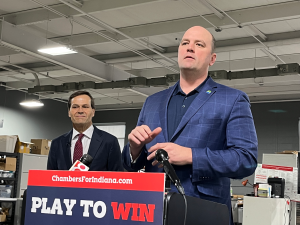
Those conversations grew to include discussions about whether Chambers should run for governor, although Fadness said he largely explained the hurdles Chambers would face with his campaign.
“He could be living a very good life, doing a variety of other things,” Fadness told State Affairs. “I think he just felt compelled to run because he wants to move Indiana forward. That kind of leadership and that kind of motivation is a rarity in politics anymore, and I guess that’s what kind of made me gravitate towards him.”
Many prominent Indiana business leaders have joined in supporting the Chambers campaign. Among those making sizable contributions are Eli Lilly and Co. CEO David Ricks ($100,000), Kittle Property Group CEO Jeffrey Kittle ($100,000), Indiana Pacers owner Herbert Simon ($50,000) and retired Lilly CEO and IEDC board member John Lechleiter ($50,000).
Chambers has been willing to sink own money — $9.6 million as of mid-April — into the campaign for his message that he’s “a business guy” focused on growing the state’s economy.
“That story resonates, but it’s six and a half million people to communicate with,” Chambers said of Indiana’s voting-age population. “It takes time and it takes resources.”
Critic calls LEAP District planning ‘underhanded’
Indianapolis-based Lilly was the first company making a major commitment to the LEAP District, with a $3.7 billion research and manufacturing campus now under construction.
Chambers points to the district as a major step toward making Indiana competitive with other states for major projects. He argues that Indiana lost out on perhaps landing a $20 billion Intel microchip plant to the Columbus, Ohio, area because it didn’t have a ready-to-build site available.
Chambers’ critics argue the LEAP District is an example of “top-down leadership” at the Indiana Economic Development Corp. that disregards the concerns of local residents and officials.
Project opponent Brian Daggy, a retired Boone County farmer, said Chambers hasn’t tried to engage with those whose homes would be affected by the LEAP District transforming what is now largely farmland into manufacturing and research facilities.
Daggy and his wife bought a house in the northern part of the district as their retirement spot a few months before finding out in late 2021 about the IEDC buying up land for the project. Daggy has turned down purchase offers and helped organize the Boone County Preservation Group, of which he’s now president.
Daggy said he understands wanting to see government operate more efficiently and business-like but that the IEDC under Chambers showed a disregard for the residents’ concerns.
“He has given all indication that he knows what’s best, and that’s what he’s gonna carry forward,” Daggy said. “It causes me concern, a lot of pause, thinking about that he would run the state in that kind of a manner.”
A proposed 35-mile pipeline to transport water from a Wabash River aquifer near Lafayette to the LEAP District has drawn opposition from the Tippecanoe County area over concerns such as a loss of irrigation for farmers and worries about environmental damage from pumping out potentially tens of millions of gallons of water a day.
Residents in the Lafayette area didn’t know the pumping tests were being carried out for the proposed pipeline last year until they suddenly didn’t have water from their wells or noticed sulfur odors from their water they had never smelled before, said Sandra Alvillar, president of the group Stop the Water Steal.
Chambers, Holcomb and Republican legislative leaders have said no work on building the pipeline will go ahead unless an ongoing aquifer study shows adequate supply.
Alvillar, however, called the IEDC’s planning for the pipeline “underhanded” and said Chambers and the agency have been focused on a public relations response rather than listening to local concerns.
“If they have not been transparent up to this point, once they’re safe in their little office, it’s not going to get better,” Alvillar said.
Chambers has kept his focus on the economy
Chambers has focused his bid for governor on economic issues and running a decidedly non-Trump-like campaign. He has largely avoided hot-button culture issues, pointing in his TV ads and public remarks to former Gov. Mitch Daniels, who had a similar emphasis while in office, as a leader he would emulate.
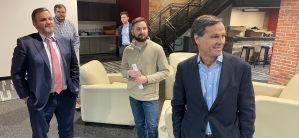
Chambers has touted his “Play to Win” plan as aiming to boost business growth in the state through steps such as more infrastructure investment and increased support for small businesses and entrepreneurs.
“The one thing that I know touches every Hoosier, not some Hooiers, is financial security and opportunity,” Chambers said. “Fundamental to quality of life is good education and public safety, and you can’t fix those or invest in those without a growing economy. I believe when people have financial security, their health is better, their kids are better, their housing is better and overall quality of life is better. So I’m just focused on the one topic where I have had some experience.”
Chambers remains an underdog in the governor’s race, as a State Affairs/Howey Politics Indiana poll in early April found U.S. Sen. Mike Braun with support from 44% of likely Republican primary voters.
Chambers, Lt. Gov. Suzanne Crouch and Eric Doden each received about 10% support — and roughly 6 in 10 respondents were unfamiliar with Chambers despite the millions of dollars he’s spent statewide on TV ads.
Fadness, the Fishers mayor, said he believed Chambers would bring a needed sense of urgency and decisiveness to the governor’s office and hoped Chambers’ focus on the state’s economy would still catch on with voters.
“Those may not be the talking points that garner the most attention from people or get the headlines, but those are the things that are going to decide the trajectory of our state for many years to come,” Fadness said. “I think they’re vitally important. But I also am, I guess, a realist in that I understand that those aren’t always what folks spend their time and attention on in a political race.”
about Chambers
- Age: 59
- Hometown: Indianapolis
- Education: Bachelor’s degree in finance from Indiana University
- Family: Married to Carol with an adult son, Nick
- Job: CEO of real estate development firm Buckingham Companies since founding it as a college student in 1984
- Work history: Indiana secretary of commerce under Gov. Eric Holcomb, 2021-23; previously chairman of the Indiana State Fair Commission
Read these related stories
- Eric Doden is running from behind but hopes his ‘bold vision’ will propel him forward
- Suzanne Crouch positions herself as a ‘different’ candidate for the voiceless
- Mike Braun on why he wants to be in politics ‘at a level of significance’
- Who is Jamie Reitenour? Indianapolis mom mobilized volunteers to make governor’s ballot
Tom Davies is a Statehouse reporter for State Affairs Pro Indiana. Reach him at [email protected] or on X at @TomDaviesIND.
X @StateAffairsIN
Facebook @stateaffairsin
Instagram @stateaffairsin
LinkedIn @stateaffairspro
